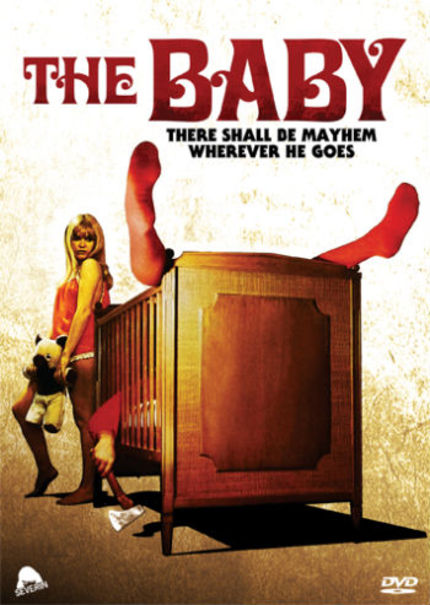70s Rewind: THE BABY

When it came to subject matter, no one can say that Post wasn't versatile.
Of his three 1973 features, The Baby was the only one rated PG in the U.S., but other countries seemed to understand its implicit depravity better than the MPAA; it received an "X" rating in the U.K. and was banned in Norway. (In contrast, the nudity-filled The Harrad Experiment received an "R" rating in the U.S. and a "15" rating in the U.K.) Post directed hundreds of episodes of television, which likely accounts for his efficiency in shooting and ability to stay on budget, and may also be why he ended up doing the first sequels to Planet of the Apes and Dirty Harry. His style is very much that of a journeyman director, but gives plentiful evidence that he knew how to stage action effectively, vary his framing and compositions, and keep the pace percolating, no matter what the subject matter.
If you can accept that a man grew into adulthood physically but remained an infant mentally and emotionally, there's nothing too odd about The Baby. Post, who took more than a year to warm up to the "abnormal" material after he was first approached to direct, wanted to emphasize the normal, everyday aspects of the characters, rather than taking a "horror movie" approach. Thus, his direction does little to suggest that it's anything but a straightforward social drama, with uncomfortable currents of weird sexual tension occasionally rising to the surface. Social worker Ann Gentry (Anjanette Comer, as pure and innocent as her hair is long) angles to be assigned to the case of Baby (David Manzy), the aforementioned adult who splits his time between a playpen and a crib, gurgling and crying and needing his diaper changed.
His mother, Mrs. Wadsworth (Ruth Roman, looking like the unholy offspring of Joan Crawford in Johnny Guitar), presides over the household with an iron fist, keeping not only Baby but also her two daughters, brunette Germaine (Mariana Hill) and blonde Alba (Suzanne Zenor), in line. Ann quickly comes to the conclusion that some type of abuse is taking place within the family -- she can find no other reason for the physically fit Baby not to be able to walk and talk -- but she seems to have an unhealthy obsession with Baby herself, spending far more time with him than with her other "clients." Ann also arouses suspicion because she keeps talking about her husband, an architect who suffered a terrible accident for which she feels guilty. And who, exactly, is Judith (Beatrice Manley Blau), a shadowy character who lives with Ann? Is she a maid? Her mother? Her mother-in-law?
The questions are eventually answered as the film is revealed to be a thriller disguised as a social drama, with a suitably sped-up, whacked-out resolution that gets progressively more unexpectedly demented as it plays, right up to the final credits. Bravo!
Throughout much of its running time, The Baby feels like an overheated melodrama, complete with line readings that are routinely off-key, with the actresses floundering, their eyes not matching what their lips are saying, as though the director didn't tell them where to look or what to do. With her deep, commanding voice, Ruth Roman as Mrs. Wadsworth comes across as a powerful, demanding authority figure, and that provides an explanation for why her daughters are so uncertain and off the wall.
There's something very disconcerting, as well, about an adult male making baby sounds and crawling around on all fours. Clearly he's the victim, but the very idea is unnerving in a way that says more about the viewer than anything else. All credit to writer / producer Abe Polsky, who crafted a screenplay that is credible and builds to an eye-popping conclusion.
The Baby is, happily, available in a beautiful Region 0 DVD edition from Severin Films. The transfer, restored from the original film negative, looks immaculate, with rich colors and a very clean appearance. Two audio interviews, one with director Ted Post (20 minutes) and the other with a very garrulous David Manzy (running 11:47, and then it's cut off), are included, as well as the original theatrical trailer and three trailers for other Severin Films releases (Psychomania, In the Folds of the Flesh, Horror Express).
All in all, this is a satisfying package and recommended for all fans of bizarre cult flicks masquerading as semi-normal mainstream films.







